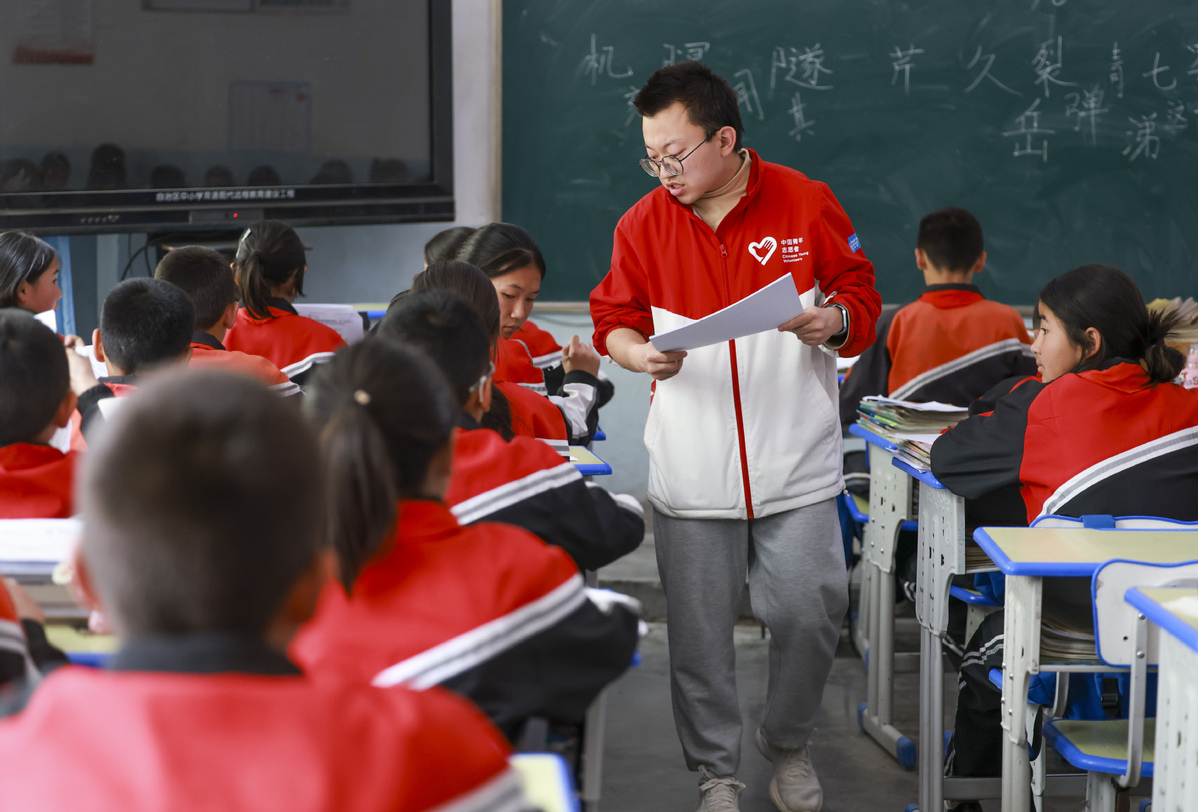




- BRNN
- BRI News
- BRNN News
- Database
Official Documents Polices and Regulations
Inter-government Documents International Cooperation BRI Countries
Business Guide Economic Data BRI Data
Trade
Investment Projects Latest projects
Cases - Content Pool

A teaching volunteer instructs students at a village primary school in Kizilsu Kirgiz autonomous prefecture, Xinjiang Uygur autonomous region, on April 23. The volunteer teaching program that began here in 2022 has helped improve the academic performance of local students over the past three years. (Photo/Xinhua)
In China's remote northwestern border region, just 47 kilometers from the frontier, there is a small primary school that has a 23-member volunteer teaching team.
With an average age of 24, these young educators have dedicated their youth and passion to the rural school in the Xinjiang Uygur autonomous region, where most of the students are from the Kirgiz ethnic group.
Wang Yizhi, a graduate of Shanxi Agricultural University, is one of the volunteers and now teaches Chinese to second-graders. After working at the border region school for two years, Wang said that she has witnessed firsthand how volunteer teaching has changed local education and promoted ethnic unity.
That was why she recently wrote a heartfelt letter to President Xi Jinping on behalf of her team, detailing their experiences when serving at the primary school in Karajol township in Artux, a city in the Kizilsu Kirgiz autonomous prefecture, while reaffirming their commitment to serving in border areas.
The volunteers were overwhelmed when they received a reply from Xi on Saturday — an unprecedented honor that filled them with immense pride and motivation.
In the message, Xi noted that more young people have chosen to serve as volunteers in the country's western regions and rural areas over the years, demonstrating their spirit of dedication and sense of responsibility. He also called on China's young people to dedicate themselves to the country's modernization drive by serving where the nation needs them most.
"We never imagined receiving such a prompt and direct response from the president, due to his busy schedule," Wang recalled, her voice trembling with emotion.
"I may not be able to do much," she added, "but I'll give it my all" — a promise that embodies the unwavering commitment she has held from the beginning.
According to Wang, there are over 290 students at the school, and most are the children of border patrollers, herders or farmers.
At the beginning, the children faced significant educational challenges, and many parents undervalued formal schooling, resulting in frequent absences, she said.
"Some parents even doubted whether we young graduates could really teach," Wang added.
Undeterred, she and her colleagues tailored their teaching to local needs and conducted over 2,000 home visits. Their perseverance bore fruit as the students learned how to speak Mandarin, how to do math calculations, and even how to speak English.
"Seeing their children's progress changed parents' attitudes," Wang said. "They started actively supporting regular attendance and learning."
This dedication earned the volunteers extraordinary trust. "Parents told us, 'You treat our children as your own, and we consider you family, '" she said.
One particularly moving moment came when a group of parents arrived unexpectedly at the school. "I at first feared a student was probably in trouble," Wang recalled. "But the parents presented me with flowers, saying in broken but sincere Mandarin: 'You are a great teacher. Our children are so lucky to have someone like you.'"
Wang's story is echoed by other volunteers. Huang Shaozhu, 24, a former international trade major, now teaches math at the school. Upon receiving the reply, she was moved to tears.
"President Xi commended us for not only promoting local education and ethnic unity, but also for contributing to prosperity and stability along the border, which is a powerful recognition of our efforts," she said.
Su Weibing, 24, an arts graduate who obtained a primary school Chinese-language teaching qualification during his service, taught students basic skills such as phonics, pen-holding, and writing with diligence and care.
Sun's efforts paid off. "We've seen remarkable progress in the Chinese performance of the class," he noted. "The average score has jumped from the 30s, all the way up to the 60s and 70s."
"I want to help the children here broaden their horizons, discover learning goals, and one day have more career choices," he said. "The nearly two-year volunteer service helps me grow alongside my students. That's my greatest reward."
Gao Chao, a 27-year-old English teacher who majored in fine arts in college, drafts detailed lesson plans and carefully designs her teaching approach for every class to ensure she delivers the knowledge clearly and effectively.
"President Xi's reply has strengthened my resolve to stay here, and I will keep his instructions in mind," Gao said, adding that she was preparing for the civil service exams in order to continue to serve on China's western frontier.
Since the 18th National Congress of the Communist Party of China in 2012, Xi has on many occasions encouraged young people to go to the west, to the countryside, and the grassroots, and go where the motherland needs them most to volunteer and make selfless contributions.
Launched in 2003, the "Go West "program has seen over 500,000 university graduates volunteer in the education, health, agriculture and social management sectors in the country's western region for a period of one to three years.
Mi Xiaobing, deputy secretary of the Communist Youth League of China Shanxi Provincial Committee, said that President Xi's reply vividly demonstrates his care for China's young people in the new era.
Among the 23 volunteers at the border school, 12 fresh graduates were selected from seven universities in Shanxi, and the province has so far deployed 10,518 volunteers under the "Go West" program, he said.

Tel:86-10-65363107, 86-10-65368220, 86-10-65363106